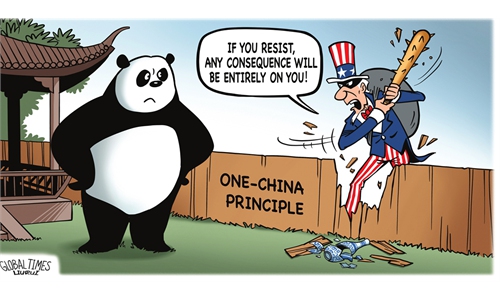Biden's national security strategy hypes 'China challenge,' full of outdated confrontational mentality

China US photo:GT
Chinese officials and experts on Thursday denounced the US for its "outdated confrontational mentality" and hyping "external threat" to divert attention from domestic problems, and urged Washington to follow the principles of peaceful coexistence and win-win cooperation, after the Biden administration described China as "America's most consequential geopolitical challenge" in its first formal national security strategy.
"It is neither popular nor constructive to hold on to the Cold War zero-sum mentality and play up geopolitical conflicts and major power competition. China and the US are both major countries in the world," Mao Ning, a spokesperson of the Foreign Ministry said at a routine press briefing on Thursday.
She said that as the biggest developing and developed country, China and the US have a responsibility of defending world peace and stability and promoting economic prosperity and development.
The US needs to follow the principle of mutual respect, peaceful coexistence and win-win cooperation, follow through on President Biden's "five-noes" commitment, and work with China to bring China-US relations back onto the track of sound and steady development, Mao said.
Laid out on Wednesday, the Biden administration's national security strategy outlined the importance of alliance in competing with China and containing Russia over the future "decisive decade," while the report hypocritically claimed that Washington does not want the world to become split into "rigid blocs" and does not want a "new Cold War."
Russia was described as posing "an immediate threat" that needed to be constrained, while China was identified as the US' "only competitor" with both "intent and power to reshape the world." According to statistics, words like Russia and Russian appeared 83 times, while words related to China, including China, PRC and Chinese, appeared 60 times in the 48-page report.
The report also said that the US remains committed to the one China policy but supports the island of Taiwan's "self defense." It also pledged that the Biden administration will prioritize domestic industrial and high tech sectors, strengthen alliances, and make investments to strengthen its military.
Chinese experts said that the Biden administration's national security strategy basically continues the Trump-era position on China, and is more of a summary of US action and intention.
The strategy suggested that the US basically has three goals it wants to achieve in the future: limit China's development in the high-tech field; limit Chinese influence, promote ideological alliances, and prevent the success of the Chinese system from being widely recognized around the world; and make further provocations over the Taiwan question to trap China, experts noted.
Lü Xiang, an expert on international relations and a research fellow at the Chinese Academy of Social Sciences, told the Global Times on Thursday that although the latest national security strategy contains many empty utterances, it is enveloped by a strong sense of confrontation.
Future prospects for China-US relations may not be optimistic, and the confrontation may be long and fierce, he said.
In the Strategy, the Biden administration said the most pressing strategic challenge is from "powers that layer authoritarian governance with a revisionist foreign policy," while portraying Washington as pursuing "a free, open, prosperous, and secure world."
By perceiving the opposition between "democracy" and "authoritarianism" as the most important contradiction, the US has actually refuted its own statement that it does not seek a Cold War in the same report.
"It is a variant of the 'the clash of civilizations'," Lü said, "it suggests that the US is trying to prove that the institutions and systems they defend still work and are even universal."
An ABC News series "Democracy in Peril" broadcast last week reported that more than two-thirds of Americans think its "democracy" is in danger of collapse, according to an August poll from Quinnipiac University. An ABC News\Washington Post poll in January shows that only 20 percent of respondents say they're very confident about the election system. As for "what can be done to restore trust in the system," experts told ABC News that the path forward is "unclear" and "very hard."
The Biden administration is now emphasizing "democracy versus autocracy," both as a "Cold War declaration" with a slightly veiled face to the world and as a political preparation at home: mobilizing supporters by portraying rivals as anti-democratic and anti-liberal, Lü said.
According to the New York Times report, Joe Biden's strategy is notable for its erasure of the distinctions between domestic and foreign policy.
Liu Weidong, a research fellow at the Institute of American Studies at the Chinese Academy of Social Sciences, told the Global Times on Thursday that with the midterm elections approaching in November, the report highlights "external threats" and the Biden administration's aggressive response, which is aimed at winning more votes.
According to the New York Times, the Strategy is often a "self-celebratory ode to American power." CNBC believes that the Strategy generally functions "more as an aspirational expression of a president's values than as a blueprint for military plans."




